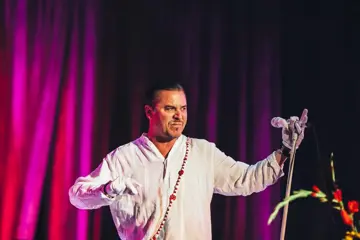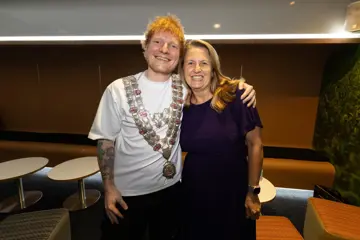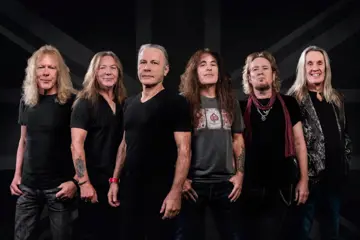 Neneh Cherry
Neneh CherryThe Swedish MC, singer and aesthete Neneh Cherry invented much of '90s pop culture. In 1989 she presaged hip hop soul with her debut Raw Like Sushi. Cherry then pioneered trip hop and avant-soul. But it's only in 2022 that the full extent of her legacy is being recognised.
In March Cherry won the NME Icon Award, presented by the youngest of her three daughters, the star Mabel. She was also the subject of The Face's viral mini-doco Neneh on YouTube. Currently, Cherry is promoting an unconventional all-female collaboration album, The Versions, with names such as Robyn, Sia, ANOHNI, Greentea Peng and Kelsey Lu covering her songs.
Today Cherry, sporting oversized hipster glasses, is at home in London, grappling with Zoom. Ironically, the trailblazer is "a technophobe". "Luckily, my daughter's boyfriend was here," Cherry quips. She is ever chatty, charming and grounded, belying her iconic status. Cherry addresses this writer as "darlin'" and compliments a cosy (read: chaotic) office. "I like it – like lots of photos and books."
Born into a creative family in Sweden, American jazz trumpeter Don Cherry her step-father, Cherry wound up in London in the '80s. An independent teen, she joined various punk bands – notably fronting Rip Rig + Panic. Cherry went solo with Raw Like Sushi, declamatory streetwise feminism, working alongside producer (and soon-to-be life partner) Cameron McVey. The lead single Buffalo Stance was a massive hit. Cherry received a Grammy nomination for Best New Artist.
Don't miss a beat with our FREE daily newsletter
Meanwhile, the collectivist Cherry and McVey quietly facilitated the Bristolian Massive Attack's seminal 1991 album Blue Lines. But, Cherry stresses, "it wasn't like we'd made loads of money and stuff." Regardless, she never envisaged the fold launching a movement in trip hop. "I don't think we really thought like that, you know – because we were inside it, rather than looking at it. It was just very funny. We had a lot of fun." Cherry subsequently recorded her own trip hop masterpiece, Homebrew. She fulfilled a trilogy with 1996's progressive soul Man.
Post-Man, Cherry became elusive, prioritising her children. Mind, she collaborated with the likes of Gorillaz, pursued side-projects and DJed. Then, in 2014, Cherry aired the pensive Blank Project – an electro-jazz LP cut with Kieran "Four Tet" Hebden. Cherry toured Australia for the first time. Buoyed, she followed with 2018's exploratory, and empathetic, Broken Politics. Cherry reunited with Massive Attack's 3D on the single Kong.
Cherry conceived The Versions after overseeing a 30th-anniversary package of Raw Like Sushi. She decided that, "it would be fun to do something more" – and had "a general little think tank session" with her manager Robin Pasricha, praising him for handling the ensuing logistics. "I have just been on a great joy ride, just having to do very little work and getting so much from it," Cherry laughs.
Instead of predictably commissioning fresh remixes, Cherry invited her favourite artists to "reinvent" or "reimagine" the classics, affording them longevity and relevance for a new generation – "the ultimate dream". "The work of other people around me is always gonna be kind of like food," she muses. "A lot of these artists are the artists that have been feeding me lately and keeping me going." However, Cherry was determined The Versions be "female-led".
The earliest vocalist Cherry considered was her friend Robyn – who, together with the rapper Mapei and auteur-producer Dev Hynes, transformed Buffalo Stance. "She was pretty much just like, 'Yeah, we'd love to do it, but is it okay if I take this song?' 'Yes!'" In fact, Cherry had previously engaged the Scandi electro-popster for Blank Project's duet Out Of The Black. Indya Moore, star of Ryan Murphy's drag ball scene TV hit POSE, dazzles in the latest Buffalo Stance video.
The Versions soon encompassed Cherry's entire discography over merely Raw Like Sushi. "I think some people felt that, 'Oh, well, quite a lot of the tracks on the first album have rap,'" she chortles. Cherry wanted artists to resonate with the material. "I just feel like, to do something like this and for it to be genuine and authentic and to kind of stand on the new legs, the songs have to mean something to the people that wanna do them – so that they can take them and have ownership of them. It's not karaoke show productions." And she was "amazed" by their enthusiasm. "You know, like [US singer/violinist] Sudan Archives, who I was completely obsessed with – I can't believe that she knows who I am."
Though Cherry's curation was personal, she had "no interest" in actively A&Ring. But ANOHNI reached out to discuss her rendition of Woman – Man's answer to James Brown's It's A Man's Man's Man's World. "I think she was just trying to find her way through the song," Cherry says. "I was like, 'Just be free.'" Curiously, she had found Woman "a bit restrictive" in live shows. Yet, as a transwoman, ANOHNI gave Woman power. "I knew that it would come from a very soulful place. I kind of like it much more than the original, actually… It bleeds. Sometimes I felt that song for me maybe just lacked a bit of blood."
Cherry is especially attached to Swedish-Gambian soulstress Seinabo Sey's interpretation of Kisses On The Wind, surprisingly deeming her own as "very dated". "When I listen to Kisses On The Wind, it makes me laugh," she confesses. "I was watching a Top Of The Pops performance, doing Kisses On The Wind, and I was just like, 'Oh my God – I look like my eight-year-old niece dancing on TikTok.'" Symbolically, Cherry welcomed her middle daughter TYSON claiming Homebrew's opener Sassy, fondly recalling the then five-year-old playing around the studio as she tracked it with Gang Starr.
In assembling The Versions, Cherry finally reflected on her accomplishments. "It's not that I'm not ambitious, because I love what I do, but I don't think I've projected a lot into my life of having these kind of goals that I'm feeling – like, 'I've gotta achieve this by that time; I've gotta do this by that time,'" she says tangentially.
Indeed, Cherry cherishes growth – and challenging herself. "I hope I just can feel as much about the things that I want to do when I'm like 50 or 60; that I still feel unfinished or that I'm still learning – not to say that sometimes it isn't completely frustrating. It's not always easy. But that's not the point, either."
Cherry acknowledges women's advances in spite of "still living in this very toxic male-dominated air." She ponders, "I think that, as women, we are becoming stronger in so many ways – and that's not just with fight, it's with depth and confidence in ourselves and trying to be better at loving ourselves. I feel that we're also gaining a kind of calm."
Still, Cherry rues that women's presence in particularly music is perceived as recent, citing a comment from a male interviewer. "I was like, 'Are you fucking kidding me?,'" she exclaims. "The matriarchy has always been a fucking powerhouse. It's just getting through that's been the fucking problem."
Now a cool grandmother, Cherry transcends generational divides. "I think that there's something very beautiful for me, like, watching my daughters and my daughters' generation and feeling a part of it. I'm definitely not gonna say I'm one of the kids, I'm an elder, but not totally an elder."
At any rate, Cherry enjoys conversing with her kids, and their friends, around the kitchen table. "I'm sure that sometimes I pretend like I know more than I do," she jokes. "But I'm also not gonna degrade my journey. I'm absolutely allergic to this kind of weird ageist thing; that youth is the only thing that matters – it's like the well of youth that we all have to try and just keep drinking out of… It's like, 'No.' We live this life to actually honour our journey. As much as I love and honour where someone is when they're 21, I'm really glad that I'm not doing it!"
Cherry continues to record cross-generational music. In 2020 she featured on The Avalanches' bop Wherever You Go with the Sydney electro-tropster CLYPSO and Jamie xx, describing the Australians' cosmic trip hop opus We Will Always Love You as "wild". "I absolutely love it." Cherry met the duo at her Melbourne concert the year prior, instantly bonding ("You know when people seem very familiar?"). She eventually laid down her vocals remotely while staying at the family escape in rural Sweden.
Cherry is already contemplating another album, even as she prepares her upcoming autobiography A Thousand Threads. "I've been writing a lot and working on something that's gonna become a book," Cherry states. "But now I'm just like, 'I really need to make some music.' And, I guess, in theory, I need to get my shit together."
Cherry has experienced that peculiar sense of suspended temporality emerging from what she theatrically enunciates as "The Pandemic". The musician admires those acts who were industrious amid lockdown, but she couldn't emulate them, rendering Versions more inspiring again. "I was just needing to process – I wasn't in such a creative place," Cherry concludes. "I need to come out of things and look back in to talk about them, because I think I create kind of stories out of things after; when I can put them in a little room and put little people in and move them around. But now I'm ready, I think, to go in the studio. I miss it."















